CN Interview: PGA Golfer Pat Perez
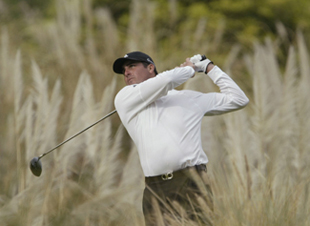
PGA Tour star Pat Perez worked his tail off to get where he is today. The road to stardom certainly did not happen overnight for this four-year veteran. If anything, this journey began when he picked up his first club as a 3-year-old and will continue until he tops that leader board consistently. A born perfectionist and competitor, Perez has that hunger to win — and win often.
Sacrifice, dedication and hard work were the recipe for his success. That along with a boatload of confidence that stems from a healthy dose of personal faith. Perez rolled the dice and left the game for a short while in the late ’90s, getting a job as there were bills to pay and not enough time to dedicate to the game he loved. He did so knowing he’d be back — and within a year, he was.
Perez fought through the adversity, made his breaks and a few years later found himself in the most elite of elite groups; a card-carrying member of the PGA Tour.
I know all this because I’m fortunate enough to have witnessed the inspirational journey first-hand. I’ve known ‘Double P’ almost ten years now. After his stint at Arizona State, we were roommates in San Diego for three years and remain the closest of friends.
I witnessed his life on the road during the Buy.com years (now called the Nationwide Tour.) I saw him grind it out in even smaller tournaments — doing all he could to play the game he loves for a living. Driving from San Diego to Vancouver for a Canadian Tour event, only to drive home a day later and hop a flight across the country because he learned he had conditional status in a Buy.com tourney.
Pardon the pun, but stories and situations like that were par for the course as Perez did everything in his power to earn a spot on the PGA Tour.
Every smaller tournament was a stepping-stone to the main stage. Nothing was going to stop him from getting to the big show. This kid has always had the fire and is primed for a breakout season in 2006. Bank on it.
Over the past four years, the rest has become history.
In December 2001, Perez was the medalist at Q-school and he earned his PGA Tour card — beating out hundreds of other determined players. Since then, thirteen top ten finishes — seven of those in the top five and a two-time runner up. Most impressive last season was a tie for sixth at the PGA Championship — a Major which Perez had a legitimate shot at winning down the stretch.
I sat down with Double P to discuss his goals heading into his fifth season on the PGA Tour, his rededication to fitness, his generous heart regarding up-and-coming players on smaller tours, as well as which off season Major League Baseball buddies have the least game on the course.
CN: Tell me a little bit about Q-school in 2000 versus 2001. I recall your disappointment after third stage in 2000 and you vowing to earn your card the next year.
Perez: As crazy as it sounds, I literally visualized it happening. I think I finished somewhere around 26th on the Buy.com Tour in 2001 with conditional status. Only the top fifteen get their PGA Tour card, so I was exempt from first stage and headed up to Seaside (up near Pebble Beach) for second stage. I played Blackhorse and finished second there. A week later I headed down to West Palm Beach with my coach, Mike Owen. Within a week, I was the Medalist and finally had my card. 2000 was a disappointment, because I came so close and really expected to get it done that year, but fell short. I won the 2000 Ozarks Open (Buy.com Tour) and was mentally prepared to get my card going into 2001. When I didn’t, I put it in my head that I’d be on the PGA Tour in 2002 and never looked back. I didn’t want to grind it out on the Buy.com Tour again. I was ready for the next level.
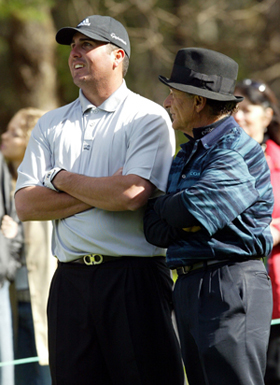
CN: How determined were you to win the whole thing at that point? Top thirty or so get their Card. Once you had it locked up, was there any letting up?
Perez: Definitely not. Besides the fact that first place was $50K and second was $25K, I wanted to win. Nothing beats the feeling of winning. Not even the paycheck. I told (Mike) Owen at the start of the week that I wasn’t just going to get my card — I was going to win the whole thing. I hadn’t won a tourney in a while and I had a feeling that it was going to be my week.
CN: Talk a little bit about your off-season regimen this year versus what you’ve done in years past. How much are you working out? How much are you practicing?
Perez: This year it’s been non-stop. I have big plans for 2006 and that isn’t happening without a hardcore off-season. I’m playing at least four to five times a week right now. The working out stuff has really been next level. Nothing I’ve ever done before. It’s not just going to the gym anymore to hit the treadmill and throw some weights around. Around mid-November, I headed over to Athlete’s Performance out here in Scottsdale. Lots of guys are in there. Last week I saw Tom Watson (PGA), Pat Burrell (MLB), Nomar Garciaparra (MLB) and Jermaine Dye (MLB) doing their off-season thing. The goal is to get your balance and alignment perfect. I’m pretty much in there from 6:00 am until 11:00 am five days a week. Working out all the ‘golf’ muscles — legs, hamstrings, quads, stomach muscles, sides, etc. I’m also working with a nutritionist to get my diet in order and shed some weight heading into the new season. Last year I trained with the Phoenix Coyotes — just learning how to skate, doing drills and strengthening my legs. I also started getting stretched a few times a day — before a round and in the evening after dinner. Going into this year I wanted to use the off-season to take everything to that next level and make sure that I was physically in the best shape possible for 2006.
CN: When 2005 came to a close, Tim Rosaforte of Golf Digest mentioned that you were shutting down the range on tourney days, much like Vijay Singh. What prompted that change?
Perez: I’ve shut it down a few times, but that’s not the norm. Believe me, I’d love to never shut it down. I really just head out there when I have some specific aspect of my game to work on, or when things are headed south. During the season you really need to save up your energy. You’re not just going to head out there and beat balls for the sake of doing so. Do that in an off week or after the season. Sometimes I’m out on the road for six to eight weeks straight. It can wear on you. There’s no sense in heading to the range if all aspects of my game are where they need to be.
CN: What advice do you have for young golfers dreaming of playing on the PGA Tour?
Perez: Work, practice, discipline and talent. You need all four. Everyone on the Tour has game and comes to play. The ones with the most discipline are the ones who are going to excel. Half-ass it and you’ll get half-ass results. You can’t do the bare minimum or you’re losing your Card the next year. Back in the day, maybe 30 years ago — these guys could play a round and then go hit the bars after a tourney. Physical fitness wasn’t anything compared to what it is now. These days you’re up early, stretching, practicing, playing 18, stretching, working out, grabbing dinner and hitting the sack. You’re eating right and holding off on the cocktails Wednesday through Sunday. Anything less than that, and seriously, you have no chance. On a personal level, you have to stand firm. If you want it, get after it. Don’t let anyone stand in your way. If it’s your dream, make it happen. Do what your heart tells you. Practice, believe in yourself and stay on track.
CN: A lot of people see the glitz and glam of being a professional athlete. How tough are those weeknights in Middle America, alone in a hotel room while friends and family are back home?
Perez: You miss home a lot. It gets to you at times. We’re home for Thanksgiving and Christmas, which is great — but you miss a lot of other holidays, birthdays, Fourth of July and other good stuff. I mean sure, sometimes it gets to you and you want to be home having a beer on the beach with your buds, but at day’s end we know what we signed up for.
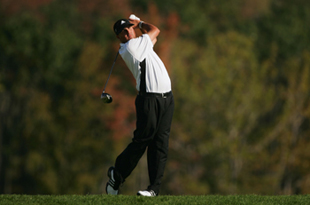
CN: What’s changed since your rookie season? You’ve really gone from a green 20-something to that next level player. What have the last four seasons taught you — about being on Tour and what it takes to succeed?
Perez: More discipline and more desire. I’m five years into it now and I’ve learned a lot being out here. I’m always thinking of ways to work on my game. I never relax. I can’t. It’s not my nature. The longer you’re out here the more you realize what it takes not only to just keep your Card, but what it takes to be great. You know you need to be on top of your game 100 percent so you can compete week in and week out with the best in the world.
CN: John Daly was recently asked who his closest friend on the PGA Tour is and he named you. How did that relationship come about? You went from mentor and pupil your first season to now calling yourselves peers and friends.
Perez: It just kind of happened. I guess he saw a lot of me in him. He’s had his share of bad press, being misunderstood, whatever. We caught up early in my rookie season (2002) a few weeks after Pebble Beach that year. He reached out to me at the Bob Hope and a week later we played a practice round at the Phoenix Open. He invited me to a BBQ that night at his RV and that became a trend that season. I spent a lot of time just hanging out on his bus, chatting and getting to become good buds my first few years out here. Him and Todd Fischer are probably the guys I hang out with most on the road. One thing I’m really trying to take from him is his patience. He has this ability to not let things bother him. He always tells me to just slow down and to enjoy it more out there. Don’t sweat the small stuff. I’m still trying to get my arms around that, though.
CN: Jason Gore surprised a lot of people on Tour last year after winning a few Nationwide tourneys. The two of you have been friends for years. He lost his Tour card soon after you earned yours and he hit a rough patch. There’s been talk that you logged some serious cell phone minutes talking with him and getting his spirits up. What were you telling him in a lot of those late-night calls?
Perez: Gore lost his card in 2003 and he was headed to the Buy.com tourney in Boise. He’ll be the first to tell you he was playing horribly. He called and said he needed to talk — and ninety minutes later we got him where he needed to be mentally. Sometimes that’s what it takes — a good chat with a bro who’s going at the same pace as you and chasing the same dream. It seemed like he was almost being too ‘proper’ you know? Befriending a lot of guys to the point where he was almost losing his competitive edge. I just reaffirmed to him that he had the game to go out there and beat all of them. It wasn’t personal — just get after it. Play his game. It’s a competition — get out there and compete. After that he went out and won back-to-back tourneys and it was on. Obviously 2005 was his breakout year. Couldn’t happen to a nicer guy.
CN: Are you working with any players currently? Last time I was in Scottsdale you had some Nationwide and Gateway Tour guys over the house — as well as some alums and former teammates from your 1996 National Championship team at Arizona State.
Perez: I’m not really working with anyone. I’m just trying to help some of the guys. My brother Mike moved to Scottsdale earlier in the year and lives down the road. He played on the Gateway Tour last year and got to third stage (Q-school) this year. I tell him to bring the guys over for BBQs and to just hang out. My place sort of has that bachelor pad feel. Pool, hot tub, fire pit, pool table, plCNa screens, video games and what not. The guys will ask me to help them with some aspect of their game. I’ll hook them up with clubs, balls, clothes — whatever. I know how it is. It wasn’t too long ago that I would have appreciated the advice or equipment. It’s the same with a handful of guys from the Arizona State days when I was there — Scott Johnson and a few others. Some of them are still local and are either on the Gateway or Nationwide Tour, trying to make it to the PGA. I’ll lean into them a little bit about the work ethic, if it’s lacking. There’s a lot to do out here in Scottsdale, but that doesn’t mean you need to hit the bars every night. If you want to make it, you have to sacrifice some. Give up some things. Get out of that comfort zone. They all personally have to determine just how bad they want it. Some guys get comfortable in their lifestyle. Do they just want to make enough to get by, or do they want to be that next level guy… make the Tour, make the big money, etc.? I tell them you can’t be afraid to succeed. Embrace it. Make it happen. Nothing should be more important in their lives than trying to earn their PGA Tour card. Go out and have fun after they’ve accomplished their goals — not before.
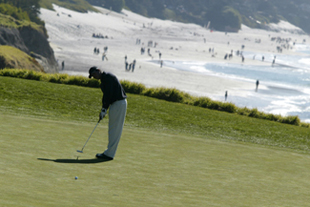
CN: What are your thoughts on the media and how they’ve treated you these past four years? Many are quick to harp on your Pebble Beach tourney in 2002 and the temper displayed on the 72nd hole. Seems to be a double standard. Other certain notable golfers are ‘determined’ when they show emotion or have an outburst — yet when you’ve been frustrated, it’s been painted as something negative.
Perez: It is what it is. Once the media sees you a certain way, you’re pretty much labeled until you do something to change their perception. They have to see a change — a good act. Start getting some wins and things will smooth themselves out, for the most part. They’ll shift their focus off the negative and on to the good stuff. At the end of the day, they are looking for a story — good or bad. They’ll help craft a nice storyline if you’re winning — I mean look at how they fell in love with Gore last year. Either way, you can’t go out of your way to please them, but you also obviously don’t want to get on their bad side. It’s all about balance. Think about how you handle the media and what you let them see, but don’t overthink it.
CN: Tell us a little bit about your new Web site, as well as your new logo and merchandise line that you are launching this year.
Perez: The Web site is PatPerezgolf.com and it’s launching this month. It’s going to be pretty interactive — not a boring, static site with just stats and info. I’m really involved with this project and I’m pretty fired up about it. As you know, we’re doing the online weekly blog and all the Q&A stuff from golf fans and those with questions pertaining to their game. I’ll have notes from the road, instructional videos, some behind the scenes stuff regarding life on the road and the downtime at home. Regarding the merchandise, we finally got my new logo wrapped up — the golf ball with the flames — and we’re going to put that on T-shirts, shot glasses, beanies, koozies and stuff. It’s cool because there’s really nothing out there like it for the X-Game type guys, rock and roll fans and edgier people who play the game. We’ll eventually have it up on PatPerezGolf.com and we’re also looking to strike a deal with Daly so we can get on his merchandise trailer he sets up on or near the course. He’s out there selling his stuff at about twenty or so tourneys a year, so I might head out there to hang with him. Hopefully get people fired up about my stuff, sell some gear, meet the fans, hang out, talk shop, you know.
CN: David Duval is proof of how a golfer can go from top to bottom almost overnight. Unlike team sports, if you have an off year there is nobody to help pick up the slack for you. How do you handle that pressure of maintaining your Tour card year in and year out and what are your goal this season?
Perez: You really have to take advantage of a hot streak or when things are going well. You’re only going to make those big checks four or five times a year. When you’re on and when you’re doing well, you have to capitalize on the momentum. Ride it out. Keep playing. At the same time, when you hit a slump you have to quickly figure out what’s going wrong and correct it before you start spiraling downward.
CN: Unlike your second year on Tour, last season you started off well and didn’t have to fight to keep your Tour card at the end of the year. How important is getting off to a good start?
Perez: Personally, I think getting off to a good start is more important than finishing strong. The confidence boost of a good start is immeasurable and usually sets the course for a strong West Coast and Florida swing. You want to get a big check or two early on. The last thing you want is to start playing bad and then it snowballs. You start to question your off-season and if you did all you could. The next thing you know its June and now the pressure is really on. Half the season is over and you’re trying to figure out where the confidence — and the paychecks — are going to come from. Before you know it, it’s September and you’re doing the math to figure out how much you need to make — checking the leaderboard hoping guys ahead of you start falling off. Makes it hard to concentrate on aspects of your game when you’re stressing making a check and keeping your Card.
CN: With so many professional athletes living in Scottsdale, as well as the PGA and MLB off-seasons overlapping with each other, I know that you’ve developed friendships with a few guys like Mark Mulder and Pat Burrell. Can these baseball guys hit a golf ball — and out of all these guys you play with, who has the worst game?
Perez: Eric Chavez is pretty good and getting better. He’s shooting 85-90. Mark Mulder, Pat Burrell, Jermaine Dye, Nick Punto, Mark Grace, Seth Joyner — all those guys — we get after it in the off-season. I recently got back from Cabo San Lucas. I went in early December with a bunch of those guys; it was two dozen Major League Baseball guys — 12 on each team. I was a captain and so was Woody Austin. The tourney ended up a tie. Woody and I just coached. We didn’t play. We just drove in a cart and made sure that no one killed each other. As for their game, they’re all great guys but they better stick to their day jobs. I don’t want to say too much or I might get a Louisville Slugger upside the head when I least expect it.
Recommend0 recommendationsPublished in Celebrity, Features, Sports
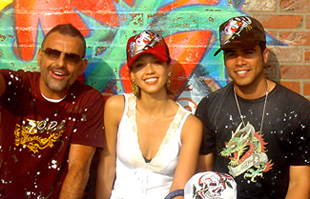
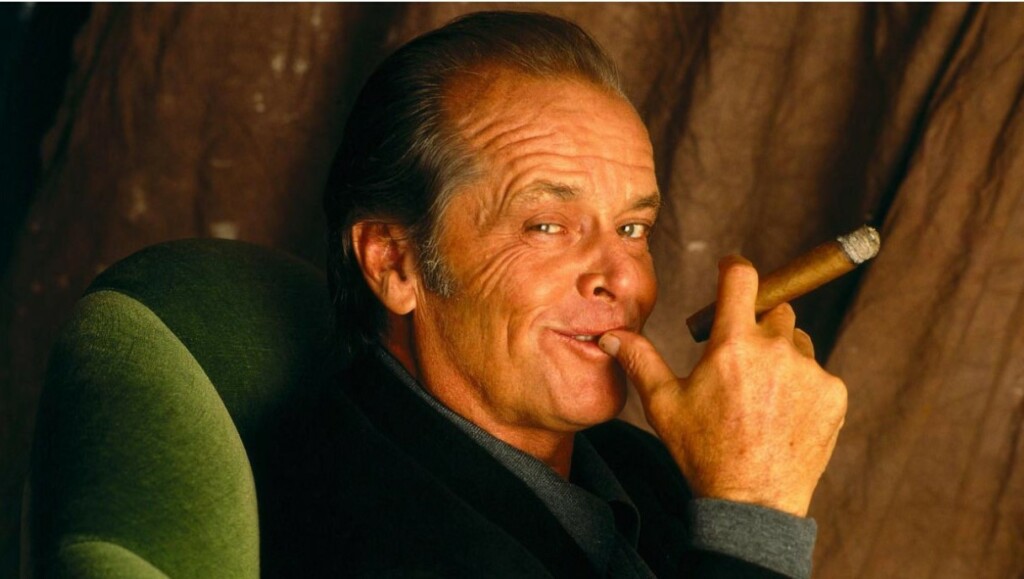
Responses